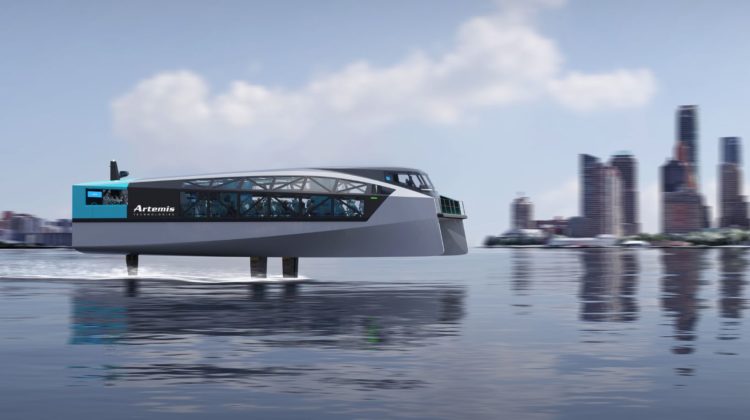
Belfast-based maritime design and applied technologies company Artemis Technologies has unveiled the design of its new 100 per cent electric EF-24 Passenger vessel, targeting the global high-speed ferry market.
The revolutionary ferry is among several zero-emission vessels being developed by Artemis Technologies, designed to provide commercially viable green transport solutions for operators, cities and governments around the world.
With a top speed of 38 knots, the EF-24 Passenger ferry offers a range of 115 nautical miles at a 25 knots cruise speed and produces incredible fuel savings of up to 85 per cent compared to conventional high-speed diesel ferries.
Powered by the patented Artemis eFoiler electric propulsion system, the 24-metre vessels will ‘fly’ above the water, providing a comfortable ride for up to 150 passengers on board, mitigating the effects of seasickness and producing minimal wake at high-speed, significantly reducing the impact on shorelines.
Artemis Technologies is a spin-off from the Artemis Racing team that competed in the America’s Cup, of which its founder, two-time Olympic champion Iain Percy OBE is a four-time veteran.
‘We have combined our experience from the worlds of high-performance sailing, motorsports, aerospace and advanced manufacturing to design and develop an electric propulsion system that is quite simply a game changer for the maritime industry,’ Percy said. ‘Our high-speed passenger ferry provides a cost-effective public transport solution that helps address air pollution, congestion and noise.
‘By encouraging multimodal transport in urban areas, we will enable cities around the world to utilise and benefit from the untapped potential of their waterways,’ he continued. ‘With hydrofoils that lift the boats out of the water, we are dramatically reducing drag. This is coupled with a submerged electric drivetrain that is exceptionally efficient, as proven through rigorous testing with our 12-metre eFoiler workboat, validating our digital simulations and performance prediction.’
The ferries will be fully accessible and extremely spacious, with a range of facilities on board, including bike racks, cabin bag and overhead storage, baby-changing facilities and charging points. The vessels will also feature a unique high-speed collision-avoidance system developed with ECIT, part of Queen’s University Belfast. The system will ensure the safety of operations in port and close to shore by safely diverting the ferry on an altered path away from marine life, debris and other in-water objects that might otherwise be obscured from view.
Artemis Technologies has partnered with Condor Ferries to operate a pilot scheme using the first EF-24 Passenger ferry. This will come into service in 2024, running between Belfast and Bangor in Northern Ireland.
‘The zero-emission ferry that will be seen departing Belfast in 2024, aptly named Zero, will be the first we build at our manufacturing hub in the city, but it is only the start,’ Percy said. ‘Many water-based cities around the world are grappling with the challenge of growing populations, congestion, and pollution. The EF-24 Passenger can provide an immediate green-transport solution that competes economically with road and rail in places such as San Francisco, New York, Venice, Istanbul, Dubai and Singapore – anywhere around the globe that is seeking sustainable transport alternatives that balance the requirement for people to continue to move around with the need to reduce carbon emissions. Especially where new infrastructure is required, like a new road or rail line, this ferry will not only be the cheapest, but also the fastest and least disruptive way to decarbonise transport networks in water-based cities.’
Earlier this year, Artemis Technologies launched the world’s largest 100 per cent electric foiling vessel, Pioneer of Belfast, and unveiled an electric workboat range, including a 12-metre multi-purpose workboat and a 12-metre crew-transfer vessel. A 24-metre crew-transfer vessel is also currently under development.


